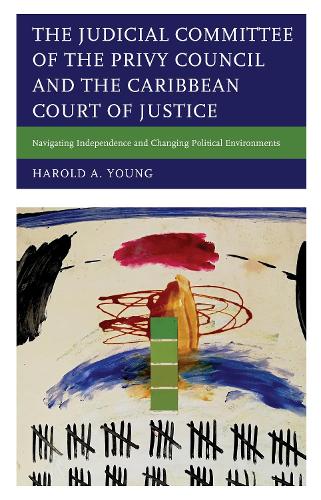
The Judicial Committee of the Privy Council and the Caribbean Court of Justice: Navigating Independence and Changing Political Environments
(Hardback)
Available Formats
Publishing Details
The Judicial Committee of the Privy Council and the Caribbean Court of Justice: Navigating Independence and Changing Political Environments
By (Author) Harold A. Young
Bloomsbury Publishing PLC
Lexington Books
31st July 2020
United States
Classifications
Professional and Scholarly
Non Fiction
Legal systems: courts and procedures
Colonialism and imperialism
Politics and government
Legal systems: civil procedure, litigation and dispute resolution
347.729035
Physical Properties
Hardback
160
Width 160mm, Height 241mm, Spine 19mm
417g
Description
Countries that have a domestic final appellate court have established a judicial institution over which they have control as part of the policymaking governing structure and how they view other existing and emerging extraterritorial courts will be influenced by their perception of the court and the role it will play when the policies of the governing coalition are challenged. This book analyzes that phenomenon in terms of the broader construction and understanding of the state in the era of international law, legal tribunals, and globalization. By zooming in on the Judicial Committee of the Privy Council (JCPC), an ancient colonial court, Harold Young examines how the Caribbean Community, specifically, the 15 former British colonies comprising the Caribbean Basin are navigating their changing political environments and transitioning to its own extraterritorial court, the Caribbean Court of Justice. Using historical reviews, descriptive analyses, and statistical methodologies Young finds that the choice to retain the JCPC at independence is influenced by the colonial experience, the length of colonial rule, and how deeply embedded the JCPC is on the governing structures of the new state.
Reviews
As a member of the English Bar with long experience of appearing before the Judicial Committee of the Privy Council, and some recent experience before the Caribbean Court of Justice, I have read Harold Young's book with great interest. He has provided a detailed and provocative analysis of the history and jurisdiction of the Commonwealth's final appellate Court, and much food for thought as to the progress of second tier appeals, now and in the future. I strongly recommend this work to my fellow professionals, who will find in it much that is new, and all of it considered with a fresh and independent approach.--James Guthrie, Queen's Counsel (QC)
Dr. Young provides a timely examination of the operation of the Caribbean Court of Justice, the Caribbean community's judicial institution. He highlights the impact of the court's decisions on Caribbean integration and indeed, the evolution of a Caribbean identity. Meticulously researched and well-written, this book is destined to become a staple on the shelves of historians, lawyers, researchers, and others interested in the development of Caribbean jurisprudence.--Kathy A.M. Gonzales, Creighton University
Dr. Young's book offers a novel and compelling assessment of how nation states make the choice to join or not extraterritorial courts. Examining former British colonies, this work argues that newly formed nation states confront the choice at independence of whether to retain the JCPC as the nation's highest court, or establish a separate national high court. Underlying this decision, as well as those at later junctures, Dr. Young theorizes, is the desire of each country to have a high court likely to support the policy goals of its leaders. Not only does this book offers important insights into the ever-changing composition of the JCPC, but it also offers a comprehensive theoretical framework for understanding how, when and why countries do or do not join supranational institutions. In an ever globalizing world, these are questions that will continue to confront nation states, and Dr. Young's work offers guidance as to how to understand their answers.--Amy Steigerwalt, Georgia State University
Thoroughly researched and unsparing in detail, this book provides deep, valuable, and relevant insight into the efficacy, independence, and politics of extra-territorial courts, specifically, the Judicial Committee of the Privy Council and the Caribbean Court of Justice. It is essential reading for students, academics, lawyers, and judges across the British Commonwealth and should be read by policymakers in those Caribbean Community member states still struggling to decide which should be their final appellate court.--Justice Godfrey Phillip Smith
Understanding across many areas of interest and inquiry is the significant contribution this book makes. The historical and the modern considerations that inform the decision to accede or not to an extraterritorial apex court are incisively examined without engaging in advocacy. It is a valuable contribution to a very topical concern.--Hon. Justice Denys Barrow
Young provides a unique analytical assessment of how an important political question impacts the highest courts. Bold, provocative and engaging scholarship. A valuable contribution to jurisprudence.--Eamon H. Courtenay, Senior Partner, Courtenay Coye LLP
Author Bio
Harold A. Young is assistant professor at Austin Peay State University.
